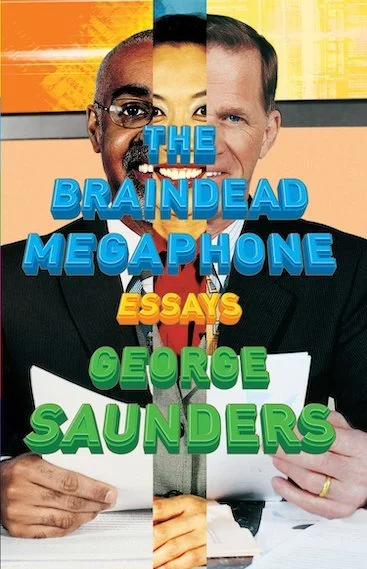The Braindead Megaphone
One of the books I read on vacation this year was The Braindead Megaphone: Essays (Riverhead) by George Saunders. As you’d expect from a book of miscellaneous writings collected and published in 2007, it’s a bit of grab bag – but one without any real duds.
In one essay, Saunders is in Dubai, observing Arab families as they experience snow for the first time in a massive indoor mall. The manufactured snow at the Arabian Ice City puts Saunders in mind of “a Syracuse parking lot after a freezing night.” On the faces of the children, though, he notes “looks of bliss, the kind of look a person gets when he realizes he is in the midst of doing something rare, that might never be repeated, and is therefore of great value. They are seeing something from a world far away, where they will probably never go.”
He has essays about Kurt Vonnegut, Esther Forbes, and Huckleberry Finn, each one enjoyable. The longest essay is “The Great Divider,” a GQ piece on self-appointed militias patrolling privately-owned ranches in south Texas (but only certain ranches; many landowners won’t give them permission). I was fascinated, and moved, by this account of a dinner conversation at a restaurant in a town called Eagle Pass:
“I announce myself as an Eastern Liberal, and am thereafter treated like a minicelebrity or lab specimen, a living example of a rare species they’ve heretofore only heard about on Fox. Paradoxically, my opinions seem to matter to them. They’re oddly deferential. They listen. When I argue that, despite our gun laws, Manhattan is safer than Houston, or assert that, yes, there are working-class people in New York City, they take me on faith, adjust their arguments accordingly, and seem happy for the correction, because it means I was taking their argument seriously in the first place.”
In these conversations with the Minutemen, they say stuff that presages MAGA populism by a decade. But despite everything that divides them, they have real conversations, exchanges of ideas – a possibility that seems increasingly endangered these days.
This crisis has to do, in part, with our seemingly bottomless collective appetite for toxic, polarizing media. Which happens to be the subject of “The Braindead Megaphone,” the essay from which the book takes its title. “I think we’re in an hour of special danger,” Saunders writes, “if only because our technology has become so loud, slick, and seductive, its powers of self-critique so inefficient and glacial.” Remember, he was writing this long before Facebook became what it now is – heck, before many social media platforms had even been invented. The “special danger” he names has intensified by leaps and bounds. So the essay still holds up and then some.
The common thread in all of these essays, it seems to me, is Saunders’ humane curiosity. He is genuinely interested in the world we share, and the people we share it with, and wants us to share that interest. I find his writing persuasive in this regard, and infectious. And I love how his trademark zany wit keeps us on our toes, whether he’s writing about work ethic or traffic or gerbils. For all these reasons, reading George Saunders is a true delight.
If you’re not yet familiar with Saunders and his work, I’d recommend setting aside an hour for his conversation with the singer-songwriter Jason Isbell about writing, the creative process, and the idea of America. Both of them are maddeningly talented writers who have experienced loads of success, but they’ll be the first to tell you it was not always so, which is part of what makes their conversation so relatable and their work so good.
